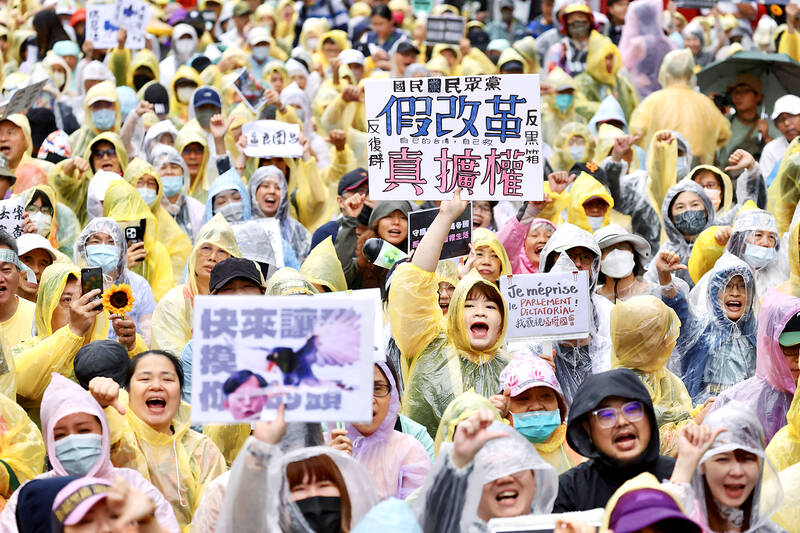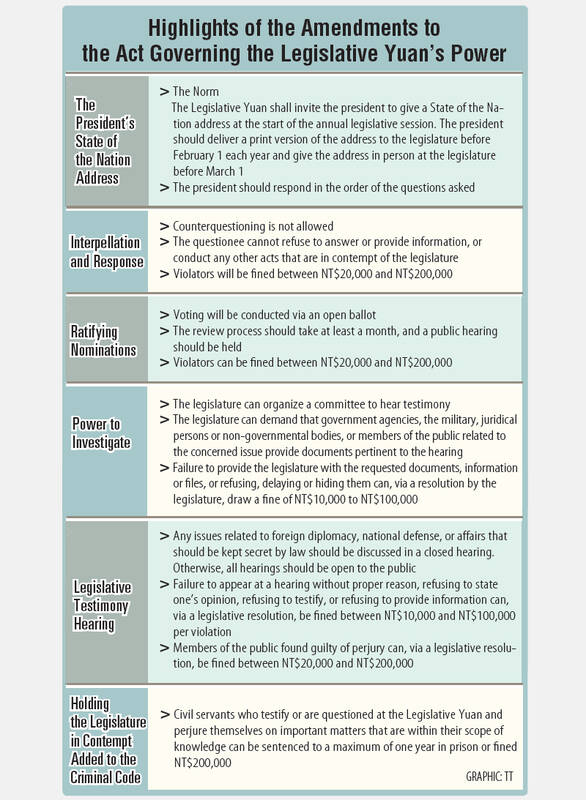The Legislative Yuan yesterday passed bills proposed by opposition lawmakers that would increase legislators’ oversight of the government as thousands of demonstrators gathered outside the venue to protest the changes.
The legislature passed the amendments to the Act Governing the Legislative Yuan’s Power (立法院職權行使法) after a day of raucous debates and scuffles between the governing Democratic Progressive Party (DPP), and the Chinese Nationalist Party (KMT) and the Taiwan People’s Party (TPP), which saw one lawmaker’s T-shirt ripped.
Progress on passing revisions to the act had been slow earlier in the day, as the DPP made legislators go through all 77 articles of the act — even those not being changed — as a stalling tactic.

Photo: Ritchie B. Tongo, EPA-EFE
The floor of the legislature was as colorful and boisterous as the streets outside, with representatives from both sides festooning the Legislative Yuan with placards.
DPP lawmakers had waved bubble tea-shaped torches, shouting: “Brush your teeth, your breath stinks” at their KMT colleagues, a reference to what they said are opposition lies about the bill.
“End the meeting if there is no discussion,” they said.

Photo: Carlos Garcia Rawlins, Reuters
Opposition lawmakers, holding sun-shaped balloons, shouted: “Let sunlight into the legislature.”
As the disagreement turned physical, KMT lawmakers yelled: “The DPP is a violent party.”
In the end, the amendments were passed on their final reading through a show of hands, with opposition lawmakers voting in favor of the changes.

Photo: Wang Yi-sung, Taipei Times
The KMT holds 52 seats in the 113-seat legislature, while the TPP has eight and the DPP has 51. Two independent legislators are ideologically aligned with the KMT.
The reforms give legislators the power to ask the military, private companies or individuals to disclose information deemed relevant by lawmakers, and compel the president to give a “state of the nation” address at the start of the annual legislative session, at which they must answer lawmakers’ questions, which would be a first in Taiwan.
They also criminalize contempt of the legislature by government officials, and made changes to the Criminal Code that would impose a fine of up to NT$200,000 and jail time of up to one year for public officials who lie during a legislative hearing.

There are concerns those powers could lead to leaks of sensitive information and punishments for those who refuse to answer questions.
The Control Yuan, the supervisory branch of the government, already has the power to investigate and impeach officials. It said in a statement yesterday that it could not accept the law passed by the legislature as it violates the division of power.
The KMT has denounced the DPP for trying to “paint them red,” the color of the Chinese Communist Party, and said that the ruling party is trying to stymie efforts to investigate corruption cases and sow unfounded fears about the reforms.
The crowds outside the legislature yesterday followed demonstrations last week that were among the largest since the 2014 Sunflower movement, when protesters stormed and occupied the legislature to block the passage of an unpopular trade pact with China.
With the help of social media, protests yesterday were quickly arranged in at least 10 cities.
Protesters have dubbed their movement the “Blue Bird Action” — named after the road next to the Legislative Yuan in Taipei where they gathered.
“Even if democracy is dead, we will not stop fighting,” shouted protesters dressed in raincoats and holding umbrellas in the rain.
They also shouted: “Refuse Chinese political interference,” among other slogans.
“Your efforts will not go to waste,” Lai Chung-chiang (賴中強), convener of the Economic Democracy Union — an organizer of the demonstrations — told protesters after the measures were passed.
The Cabinet should send the bills back for another legislative review, he added.
The DPP has pledged to seek a constitutional review.
“There will be two violations of the Constitution,” DPP caucus whip Ker Chien-ming (柯建銘) said on Monday, adding that they were procedural and substantive contraventions.
In a statement released late last night, the Executive Yuan said it will return the bills to the legislature for reconsideration.

The Central Election Commission has amended election and recall regulations to require elected office candidates to provide proof that they have no Chinese citizenship, a Cabinet report said. The commission on Oct. 29 last year revised the Measures for the Permission of Family-based Residence, Long-term Residence and Settlement of People from the Mainland Area in the Taiwan Area (大陸地區人民在台灣地區依親居留長期居留或定居許可辦法), the Executive Yuan said in a report it submitted to the legislature for review. The revision requires Chinese citizens applying for permanent residency to submit notarial documents showing that they have lost their Chinese household record and have renounced — or have never

A magnitude 5.6 earthquake struck off the coast of Yilan County at 12:37pm today, with clear shaking felt across much of northern Taiwan. There were no immediate reports of damage. The epicenter of the quake was 16.9km east-southeast of Yilan County Hall offshore at a depth of 66.8km, Central Weather Administration (CWA) data showed. The maximum intensity registered at a 4 in Yilan County’s Nanao Township (南澳) on Taiwan’s seven-tier scale. Other parts of Yilan, as well as certain areas of Hualien County, Taipei, New Taipei City, Taoyuan, Hsinchu County, Taichung and Miaoli County, recorded intensities of 3. Residents of Yilan County and Taipei received

Taiwan has secured another breakthrough in fruit exports, with jujubes, dragon fruit and lychees approved for shipment to the EU, the Ministry of Agriculture said yesterday. The Animal and Plant Health Inspection Agency on Thursday received formal notification of the approval from the EU, the ministry said, adding that the decision was expected to expand Taiwanese fruit producers’ access to high-end European markets. Taiwan exported 126 tonnes of lychees last year, valued at US$1.48 million, with Japan accounting for 102 tonnes. Other export destinations included New Zealand, Hong Kong, the US and Australia, ministry data showed. Jujube exports totaled 103 tonnes, valued at

BIG SPENDERS: Foreign investors bought the most Taiwan equities since 2005, signaling confidence that an AI boom would continue to benefit chipmakers Taiwan Semiconductor Manufacturing Co’s (TSMC, 台積電) market capitalization swelled to US$2 trillion for the first time following a 4.25 percent rally in its American depositary receipts (ADR) overnight, putting the world’s biggest contract chipmaker sixth on the list of the world’s biggest companies by market capitalization, just behind Amazon.com Inc. The site CompaniesMarketcap.com ranked TSMC ahead of Saudi Aramco and Meta Platforms Inc. The Taiwanese company’s ADRs on Tuesday surged to US$385.75 on the New York Stock Exchange, as strong demand for artificial intelligence (AI) applications led to chip supply constraints and boost revenue growth to record-breaking levels. Each TSMC ADR represents